Increasing Poverty Impacts Iranian Dairy Consumption
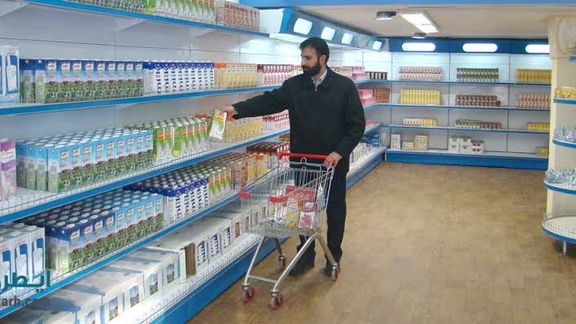
Poverty levels in Iran have reached such depths that even dairy is becoming increasingly unaffordable for the general population.

Poverty levels in Iran have reached such depths that even dairy is becoming increasingly unaffordable for the general population.
Customs statistics reveal a notable increase in the export of Iranian dairy products during the first seven months of this year compared to the same period last year. While this initially appears as positive news, the underlying reality paints a more complex picture.
Contrary to a surge in production, the surge in dairy exports is attributed to a surplus of raw milk. The primary driver behind the surplus, however, is not an excessive production beyond consumption needs but rather a significant decline in the purchasing power of the Iranian people, for whom dairy products are becoming increasingly out of reach.
Reza Bakeri, the secretary of the Iranian Dairy Processing Industries Association, commented on the development, noting that “the per capita consumption of dairy products in Iranian society has dwindled due to the diminished purchasing power of the population, resulting in a surplus of raw milk.”
Adding to the economic woes, the inflation rate in the past Iranian month reached its highest point in two years. The government, grappling with substantial budget deficits, has resorted to printing more money, exacerbating the challenges faced by the Iranian economy.
The trend began last year, when Iran’s health ministry announced that the average consumption of milk and dairy products had decreased about 30 percent in the last two years due to rising food prices and inflation.
Despite having the biggest dairy products factory in the Middle East, Iran has a per capita consumption of about 60 to 80 kilograms a year, that is about half of the global average.
The Iranian currency has experienced a significant devaluation, losing its value by 12-fold since 2018, a period marked by the US withdrawal from the JCPOA nuclear accord and the imposition of sanctions.
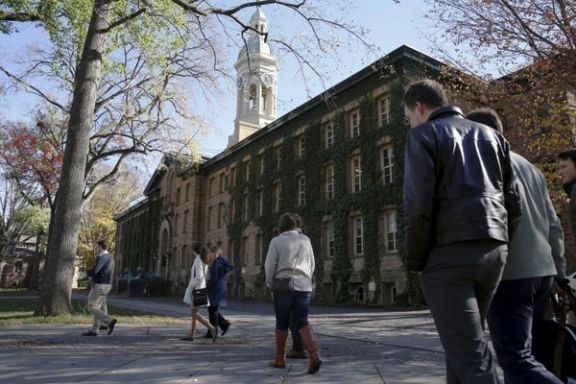
Princeton's Hossein Mousavian has been drawn out of the shadows by a congressional probe into his alleged failure to help rescue Xiyue Wang from captivity in Iran.
The House Committee on Education and the Workforce announced on November 16 that the New Jersey-based Princeton University is the subject of an investigation over the role of its controversial academic Mousavian, a former Iranian regime ambassador to Germany.
The twelve Republican lawmakers wrote: “During Mousavian’s tenure at Princeton, one of its students, Xiyue Wang, was held hostage in Iran. Given Mousavian’s experience as a former high-ranking official with the government of Iran, did Princeton ask Mousavian to assist in any way for Xiyue Wang’s release? Did Mousavian offer to use his contacts to try to free Xiyue Wang?”
The congressional representatives requested that Princeton University President Christopher L. Eisgruber answer their questions about Mousavian’s alleged failure to aid the Chinese-American scholar Wang.
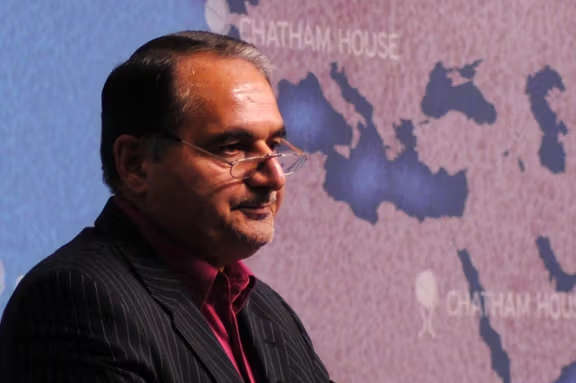
Wang told Iran International that “Princeton did not use its leverage, Mousavian, to get me out and it is not using its leverage to get Elizabeth Tsurkov out.”
Tsurkov,a Russian-Israeli PhD student at Princeton University, was kidnapped by the pro-Iran regime militia Kata'ib Hezbollah in March, 2023 in Iraq.
“Based on my understanding that Mousavian did not help me I would guess he is not working to help Tsurkov, “added Wang, who was imprisoned in Iran between August, 2016 and December 2019.
He and his wife, Hua Qu, sued Princeton University in 2021. Wang and his wife claimed they suffered “severe personal injuries and other irreparable harm, with respect to Princeton’s “reckless, willful, wanton, and grossly negligent acts.”
Wang and Qu settled the lawsuit in September. The elements of the settlement have not been made public. The 45 page civil suit against Princeton, which includes 16 mentions of Mousavian, can be read here.
In his first interview with Iran International, the embattled Princeton academic Mousavian said about Wang’s accusations that “Such claims are because they do not understand Iran. It is true that I was the former spokesperson for Iran’s nuclear negotiation team and a friend of the then Iranian President Hassan Rouhani and Foreign Minister Mohammad Javad Zarif during my service at the Iranian foreign ministry. “
Mousavian added, “However, neither Rouhani as the then president, nor Zarif as the then foreign minister had no power, influence and authority to intervene in Wang’s case. In 2009, an Iranian court sentenced the brother of President Hassan Rouhani, Hossein Fereydoun, to five years in prison.”
Wang countered that “The problem is not really whether Zarif or Rouhani could help. The problem is Mousavian decided he was not going to do anything. Iranian intelligence first confiscated my passport. And 18 days later they arrested me. During this time , I asked Princeton to ask Mousavian to help. And Mousavian decided not to do anything. When you have a person with that level of connections in your institution, you would expect he would act.”
When Iran International first asked Mousavian about the two Princeton students who were kidnapped, the former ambassador said, “I don’t know the students, but I believe any kidnapping, assassination and terror by anyone, anywhere and for any reason is a clear violation of international rules and regulations.”
Wang’s lawsuit stated, “Since joining Princeton in 2009, Mr. Mousavian has written many articles and made many media appearances where he has advocated in favor of the United States allowing Iran to obtain nuclear capabilities. Mr. Mousavian is understood to be a strong and avid supporter of the current Iranian terrorist regime. Mr. Mousavian frequently published pro-regime articles throughout Mr. Wang’s imprisonment in Evin Prison.”
Wang said, “Princeton knew I was held as a hostage as a bargaining chip and yet they were allowing Mousavian to use Princeton to promote the Iranian regime’s interests in the US, Iran and around the world.”
He asked “Why is Mousavian allowed to use his Princeton byline to criticize the US while I am in jail? Princeton, at the level of the university, is in the forefront of the pro-Iran engagement policy. Princeton’s pro-Iran engagement is not working.” He cited the case of Tsurkov, noting “When you have a student get arrested again in the span of a few years that says something.”
Wang said he was “glad” the congressional committee is investigating Princeton and Mousavian, adding they are “asking Princeton some questions that it really needs to answer. Mousavian is representing the Iranian regime unofficially. This is not academic freedom but harboring an agent. Why is Princeton giving the Iranian regime a prestigious platform for the Iranian regime’s interests? Princeton needs to come clean.”
Numerous Iran International press queries to Princeton University went unanswered.

In September, Iranian state television shut down its Jam-e Jam channel, designed to convey the Islamic Republic's message to millions of expats in the diaspora.
The closure, largely overlooked by Iranian media and officials, underscored the regime's struggle to propagate its ideological messaging among Iranians who had emigrated to avoid exposure to such totalitarian and biased content.
Saeed Fanian, a former manager of Jam-e Jam, contends that the channel's shutdown highlights the breakdown of the state television organization's monopoly on TV broadcasting. He specifically pointed the finger at Vahid Jalili, the deputy chairman of IRIB (Islamic Republic of Iran Broadcasting), for lacking the necessary expertise to lead the channel.
Fanian also criticized IRIB Chief Peyman Jebelli for failing to fulfil promises to restore the broadcaster's credibility. According to Fanian, a successful television program should challenge authorities and convince the audience of its fairness -- elements he believes the state TV failed to achieve.
Fanian, an Iranian academic headed IRIB's newsroom from 1988 to 1994 and the Jam-e Jam channel from 2003 to 2009. He believes that the state television launched Jam-e Jam to confront the influence of foreign-based satellite television channels which were new in the Iranian media landscape in the 1990s.
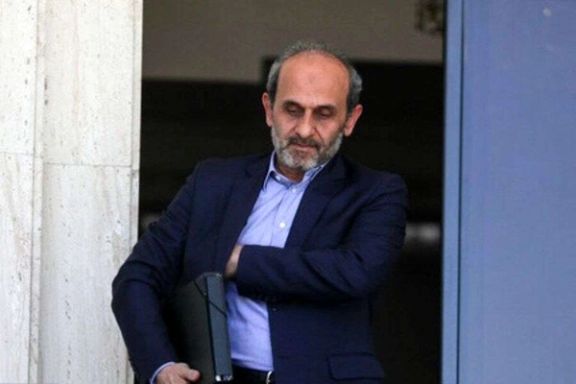
However, with the proliferation of more foreign-based professional Persian networks after 2009, the channel lost its appeal for expatriates, who appreciated the transparent political slant of the foreign-based networks. The viewership of Jam-e Jam's three channels for Europe, US and Australia began to drop and during the past years only one of the three channels were beaming to Europe and parts of the United States. However, even Iranian officials admitted that very few Iranian expats tuned to Jam-e Jam for news or entertainment.
Toward the end of its lifetime as hardliners at home pushed their radical cultural policies, the channel stopped broadcasting Iranian music which was more or less the only interesting program on Jam-e Jam after 2009. On the other hand, the channel did not have anything to offer to Iranians who became increasingly politically minded after the disputed presidential election in 2009 and particularly with the start of major protest demonstrations in 2017. There was no trace of the protests and dissent in general on the channel whatsoever.
It was around the same time that major foreign-based channels including Iran International, BBC Persian and Manoto TV began to offer more programming on Iran's domestic politics and hot issues such as human rights violations in Iran. They catered to the needs of Iranians inside and outside of the country for accurate and unbiased information about events in the country.
In his interview, Fanian admitted that Jam-e Jam was somewhat successful before these channels appeared on the Iranian media landscape. While he still believes that Jam-e Jam's winning edge toward the end of its activity was broadcasting Iranian TV sitcoms, a recent report on Kahabr Online website indicates that the state TV lost its edge as online platforms in Iran started to produce their own series with less radical censorship.
A study cited by Khabar Online reveals that despite the state TV's monopoly on broadcasting and its extension of censorship to video-on-demand (VOD) services, TV series produced by the state were significantly less successful than those offered by VOD platforms. Notably, even though state TV provided its content for free, VOD series such as "Fatal Wound" and "Return" had nearly double the viewership of all state TV series combined. Another example is the comedy series "How Many Springs There Are in A Lifetime," which has maintained successful viewership on VOD platforms for over five months.
The decline in viewership extends to both news programs and entertainment shows on state TV and its Jam-e Jam channel, losing audiences to online platforms within Iran and foreign-based satellite television channels. Polls conducted domestically and internationally corroborate the substantial drop in state TV viewership. As a result, the government may find it increasingly difficult to justify investing funds in a propaganda machine that has lost its efficacy.
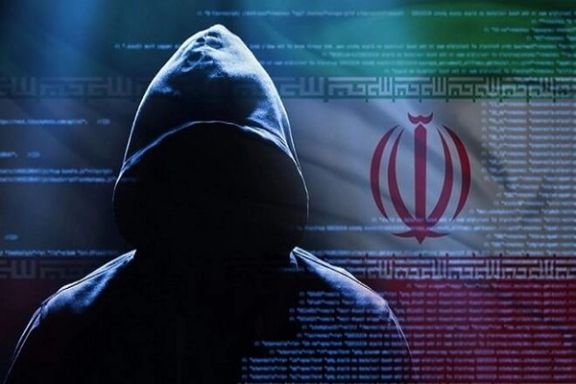
The Aliquippa Municipal Water Authority in Pennsylvania revealed one of its booster stations had fallen victim to a cyber-attack by an Iranian-backed group.
Matthew Mottes, Chairman of the Board of Directors for the Municipal Water Authority, disclosed to KDKA-TV that the hacking group, identified as Cyber Av3ngers, successfully took control of the station, setting off an immediate alarm.
The station, located on the outskirts of Aliquippa, plays a crucial role in managing pressure for Raccoon and Potter Townships. Mottes sought to allay public fears by affirming that, as of now, there is no identified risk to the drinking water or water supply.
The compromised system operated on a Unitronics platform, with Mottes highlighting the ownership of certain software or components by Israel. Subsequent to the breach, the system has been deactivated, and the Pennsylvania State Police have been called in to conduct a thorough criminal investigation at the booster station.
CyberAv3ngers has claimed responsibility for a series of global cyber assaults including on Iran’s archenemy Israel. As of October 30, their X page detailed attacks on ten water treatment stations in Israel in the midst of the Gaza war.
In September, the group claimed involvement in an alleged cyberattack targeting Israel's railroad network, disclosing sensitive information about its electrical infrastructure.
However, the railway operator refuted the occurrence of any cyberattack. The hacktivist collective also took credit for disabling the website of Israel's largest oil refinery, BAZAN Group in July, accompanied by the release of purported screenshots depicting the company's internal systems.
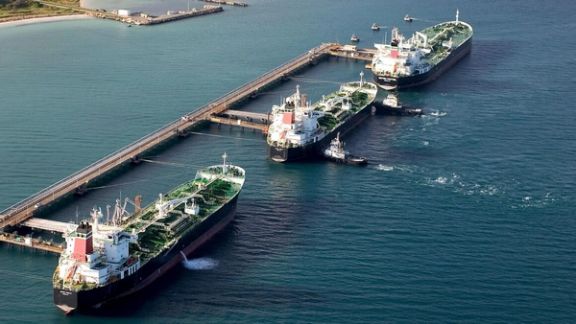
Iran's draft budget for 2024-2025, presented to the parliament, reveals a significant decline in oil and gas export revenues, and a surge in domestic energy prices.
The bill outlines a projection of 1.35 million barrels per day for oil exports at an average price of €65 per barrel (approximately $71) in the upcoming fiscal year (starting March 21), representing a 10% reduction in volume and a 16% decrease in prices compared to the current year's budget. Despite these cuts, the overall forecast for oil revenues in the budget indicates only a 3% decrease from the current year, signaling a substantial increase in domestic energy prices, particularly impacting industries, businesses, and households.
Davoud Manzoor, the head of the Planning and Budget Organization, recently disclosed a 40% overestimation in oil export revenues for the current year, leading to a significant budget deficit. This suggests a shift toward raising domestic energy prices due to disappointment with oil export revenue growth, contradicting claims by Iranian oil officials, including the Minister of Oil, about an increase in the country's oil production and exports.
International reports in August and Iranian official statements had indicted that daily exports had well surpassed 1.5 million barrels, but next year’s budget projection is based on the lower number.
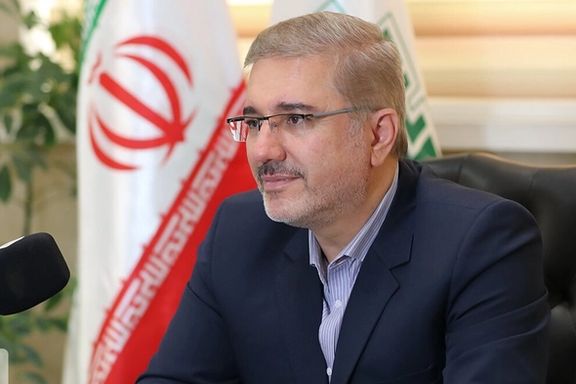
Data from the commodity intelligence company Kpler and energy consultancy firm Vortexa suggest that Iran's daily oil exports to China have remained below 1.05 mb/d in ten month of 2023. Despite a notable summer increase, shipments declined in the fall.
Additionally, recent US legislation intensifying sanctions on Iranian oil, if implemented, could further restrict Iran's oil exports.
The draft budget for this and the next fiscal year does not distinguish revenues from the domestic and foreign sale of oil and gas. However, the government's forecast of a 50% surge in next year’s tax revenues indicates that the Raisi administration aims to place a greater burden on the Iranian people to compensate for budget deficits.
Achieving expected oil revenues: aspiration or reality?
The Parliament Research Center has predicted that this year's government budget will face a deficit of 4,250 trillion rials ($8.5 billion based on USD rate in Iran’s open market). This equals to 20% the current year’s budget. In recent years, Iranian governments, to compensate for budget deficits, have significantly increased taxes on people, traders, and industries, in addition to borrowing heavily from financial institutions and banks.

The Raisi administration also plans to increase the sale of bonds by 36% year-on-year to 2,550 trillion rials. For better comparison, the amount of government debt from the sale of bonds for the coming year alone will be equivalent to half of the total revenues from oil and gas exports and domestic sales.
International Monetary Fund (IMF) statistics show that government debt has sharply increased in recent years, reaching 34% of the GDP in 2022, or 118 billion dollars.
In the current fiscal year, the Iranian government has projected daily oil exports at 1.35 million barrels per day (mb/d) with a price of $71 per barrel. However, Iran's actual daily oil exports to China, its main customer, hover just above one million barrels, and despite current global oil prices reaching around $74 per barrel, Iran offers a discount of about $12 per barrel to Chinese refineries. Consequently, approximately 30% of Iran’s oil export revenues are lost due to sanctions evasion and discounted sales to Chinese refineries.
As a result, not only is it unlikely that the targeted volume of oil exports will be realized in the budget for the next fiscal year, but achieving the predicted price for Iran's oil exports is also improbable. In essence, the government is anticipated to face a considerable budget deficit in the upcoming year. The International Monetary Fund has forecasted that, to avert an Iranian budget deficit for the next fiscal year, global oil prices would need to exceed $317 per barrel.
Natural Gas Exports
In the current fiscal year, the Iranian government has set a target of 1.35 million barrels per day (mb/d) for daily oil exports, with a projected price of $71 per barrel. However, Iran's actual daily oil exports to China slightly surpass one million barrels. Despite global oil prices reaching approximately $74 per barrel, Iran provides a discount of about $12 per barrel to Chinese refineries. This results in an approximate loss of 30% of Iran’s oil export revenues due to sanctions evasion and discounted sales to Chinese refineries.
As a consequence, not only is it improbable that the targeted volume of oil exports will be achieved in the budget for the next fiscal year, but attaining the predicted price for Iran's oil exports is also unlikely. Essentially, the government is expected to confront a significant budget deficit in the upcoming year. The International Monetary Fund has forecasted that, to prevent an Iranian budget deficit for the next fiscal year, global oil prices would need to surpass $317 per barrel.
Dr. Umud Shokri, Energy Strategist and Senior Visiting Fellow at George Mason University
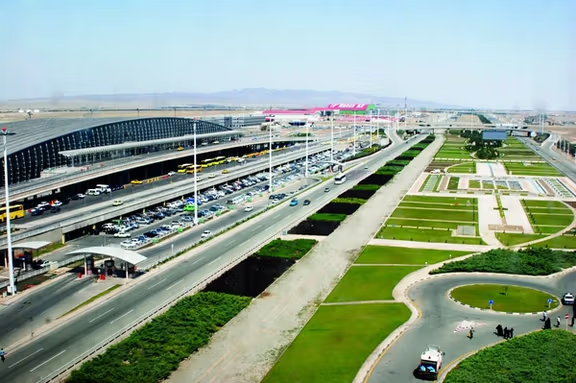
Amid ongoing economic crisis, Iran has revealed an expansion plan for its main international gateway in Tehran, with the construction to be awarded to the Revolutionary Guard.
Iran's Minister of Roads and Urban Development, Mehrdad Bazrpash, declared on Saturday that China is set to invest €2 billion in the construction of the second phase of Imam Khomeini International Airport.
Bazrpash urged private sector companies to collaborate in the implementation of this substantial project.
The first phase of IKIA's development, according to him, with a budget of $500 million, is scheduled to become operational in March 2025.
Bazrpash further asserted that a Chinese company would contribute over €2 billion for the completion of the second phase's construction.
Earlier statements from Saeed Chalandari, the CEO of IKA (Imam Khomeini Airport Company), revealed that the construction contract was signed with an undisclosed Chinese company after negotiations with various domestic, and international contractors. However, IRGC officials said on Saturday that their construction company will be the main builder.
However, the backdrop of this development is accusations against several Iranian airlines, including Mahan Air, linked to the Islamic Revolutionary Guard Corps (IRGC). The airlines have faced bans from countries such as the US and France, for their alleged involvement in transporting military equipment and personnel to conflict zones in the Middle East.
Despite a touted 25-year strategic partnership agreement between China and Iran, Tehran has found itself somewhat excluded from Beijing's Belt and Road Initiative and other regional investments, largely due to US sanctions. Notably, China has only inked two investment agreements with Iran from 2013 to 2023, and one of them was canceled in 2018 when the United States withdrew from the JCPOA nuclear agreement with Iran.